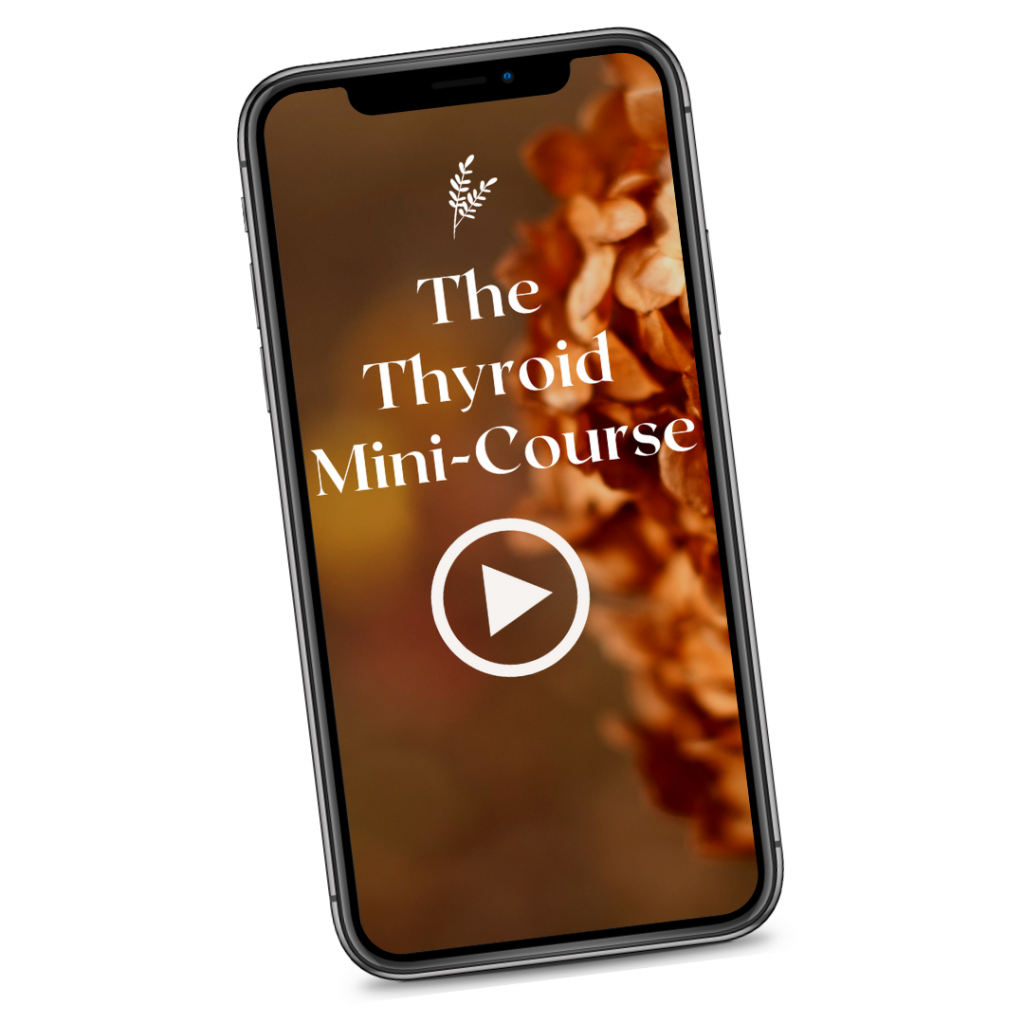Do you know someone or have you been diagnosed with hyperthyroidism (high thyroid)? Like hypothyroidism (low thyroid), hyperthyroidism can affect fertility chances for both men and women. While not as common as low thyroid, hyperthyroidism affects 2-3% of the population at some point in their lives. Solving thyroid problems before conceiving is more important than you think!
Graves’ disease, an autoimmune disorder where the thyroid overproduces hormones, is the most common cause of hyperthyroidism. It causes many symptoms, tends to run in families, and is more common in women than men. Additionally, some people with thyroid problems flip between low and high thyroid levels, adding more complexity to the problem.
While hyperthyroidism requires medical treatment, natural therapies can be considered to ease symptoms and improve fertility. For your best health, it’s important to work with guidance from a qualified health professional if you’ve been diagnosed.
Thyroid hormone testing is necessary to find out for sure, but here are hyperthyroidism symptoms to watch for:
- Thyroid nodules (goiter); swollen thyroid
- Bulging or prominent eyes (Graves Orbitopathy)
- Menstrual cycle changes: short menstrual cycle (less than 5 days), irregular cycles, light cycles or cycles that are far apart
- Low sperm count/low testosterone
- High metabolic rate/sweating
- Racing or irregular heartbeat
- Insomnia/mood swings/irritability
- Unexplained weight loss/diarrhea
- Bone loss/osteoporosis
- Family history of hyperthyroidism
Hyperthyroidism & Your Fertility
Hyperthyroidism decreases conception chances in a few ways. In men, hyperthyroidism can lower sperm count and testosterone. It increases the risk for ED (erectile dysfunction). In women, it can lead to irregular cycles and affect ovulation. Hyperthyroidism in pregnancy is serious because it increases the risk of miscarriage, preeclampsia or preterm birth.
If you have hyperthyroidism and plan to conceive, work closely with your doctor to make sure your thyroid levels are properly managed. Having a healthy thyroid improves your chances of a healthy pregnancy and delivery.

Learn How To Support Your Thyroid Naturally With My Thyroid Mini-Course
- Learn how to support your thyroid naturally with nutrition, supplements and plants.
- Know how to tell whether your thyroid, endocrine system or/and adrenals needs support
- Self-care therapies to support your thyroid and endocrine system
Natural Options for Thyroid Balance
Natural therapies can be explored for symptom relief and improved fertility if you have hyperthyroidism, but it is important to continue thyroid monitoring and to have guidance from your doctor or other qualified health practitioners for long term recovery.
Dietary triggers worsen autoimmune thyroid reactions:
- Watch dietary iodine. Iodine aggravates hyperthyroidism by stimulating thyroid hormone production. Early research links hyperthyroidism to excessive iodine intake in people with preexisting thyroid disease. Limit or avoid iodine-enriched foods like salt, bread and dairy products; and foods high in organic iodine like fish and seaweed.
- Consider eliminating gluten and get tested for celiac disease. 2012 research published in Polish Journal of Endocrinology finds there is a higher incidence of celiac disease in people who have autoimmune thyroid problems. A report published in BMJ Case Reports suggests untreated celiac disease could make thyroid problems less responsive to medical management. For people with celiac disease or gluten sensitivity, following a gluten-free diet is the best way to encourage better gut and thyroid health. Learn more: Can a Gluten-Free Diet Improve Fertility?
- Eat calcium and magnesium-rich foods like almonds, dark leafy greens, carrots, legumes, avocado and broccoli for bone health. Graves’ disease makes it harder for the body to absorb bone-building minerals. Add Coral Calcium or another calcium/magnesium supplement for extra bone health support.
- Ask your doctor about selenium therapy. Research finds selenium improves quality of life, slows the progression of thyroid eye disease (Graves Orbitopathy), and improves outcomes for eye health. Today, the European Thyroid Association recommends a six-month trial of selenium supplementation for people with thyroid eye disease. The safe upper limit dosage for an adult is 400mcg daily (including from food sources). Have your selenium levels evaluated and ask your doctor about the best dosage for your needs.
Click here to learn more about a nutritional and herbal supplement for thyroid health…
Calm symptoms with herbs. Try gentle teas or high-quality herbal extracts as directed for the best results.
- Motherwort (Leonurus cardiaca)- helps relax the heart, ease stress reactions and insomnia.
- Bugleweed (Ajuga virginicus)- supports normal thyroid function; may help prevent thyroid antibodies from binding to the thyroid.
- Lemon balm (Melissa officinalis)- supports normal thyroid function; decreases anxiety and sleeplessness.
Rebalance Thyroid Health- Restore Fertility
Having hyperthyroidism can be disrupting to your fertility efforts, but effective treatment options (natural and medical) are available. For some people, hyperthyroidism is a lifelong issue. For others, it’s a transient problem, lasting only a few years. Find out about all your choices for support. Work with your doctor if you suspect hyperthyroidism is affecting your health and fertility.
- Common Signs Indicating Hyperthyroidism. (2019). Retrieved from: https://healthprep.com/articles/conditions/8-signs-you-may-have-hyperthyroidism/
- Hyperthyroidism and Getting Pregnant. (2018, May). Retrieved from: https://www.shecares.com/pregnancy/conditions/hyperthyroidism
- Hyperthyroidism & Fertility. (2019). Retrieved from: https://www.parenting.com/article/hyperthyroidism-fertility
- 3 Herbs Which Can Help With Hyperthyroidism. (2012, Aug.). Retrieved from: https://www.naturalendocrinesolutions.com/articles/3-herbs-which-can-help-with-hyperthyroidism/
- Auf’mkolk M et al. (1985, May). Extracts and auto-oxidized constituents of certain plants inhibit the receptor-binding and the biological activity of Graves’ immunoglobulins. Endocrinology; 116(5):1687-93. Retrieved from: https://www.ncbi.nlm.nih.gov/pubmed/2985357
- Meyers, Amy, MD. (2019). 5 Causes of Graves Disease and 5 Solutions for It. Retrieved from: https://www.amymyersmd.com/2018/07/5-causes-graves-disease-5-solutions/
- Male Specific Symptoms of Hyperthyroidism. (2019). Retrieved from: https://www.healthline.com/health/mens-health/hyperthyroidism-in-men#Male-specific-symptoms-of-hyperthyroidism
- Joshi et al. (2014, Oct.). Graves’ disease and coeliac disease: screening and treatment dilemmas. BMJ Case Rep. pii: bcr2013201386. doi: 10.1136/bcr-2013-201386. Retrieved from: https://www.ncbi.nlm.nih.gov/pubmed/25342186
- Miskiewicz, Piotr et al. (2012). Coeliac Disease in endocrine disease of autoimmune origin. Polish Journal of Endocrinology; Volume 63; Number 3. Retrieved from: https://journals.viamedica.pl/endokrynologia_polska/article/viewFile/25176/20005
- Shomon, M. (2019, March). What To Know About Selenium and Your Thyroid. Retrieved from: https://www.verywellhealth.com/selenium-and-your-thyroid-4134998





